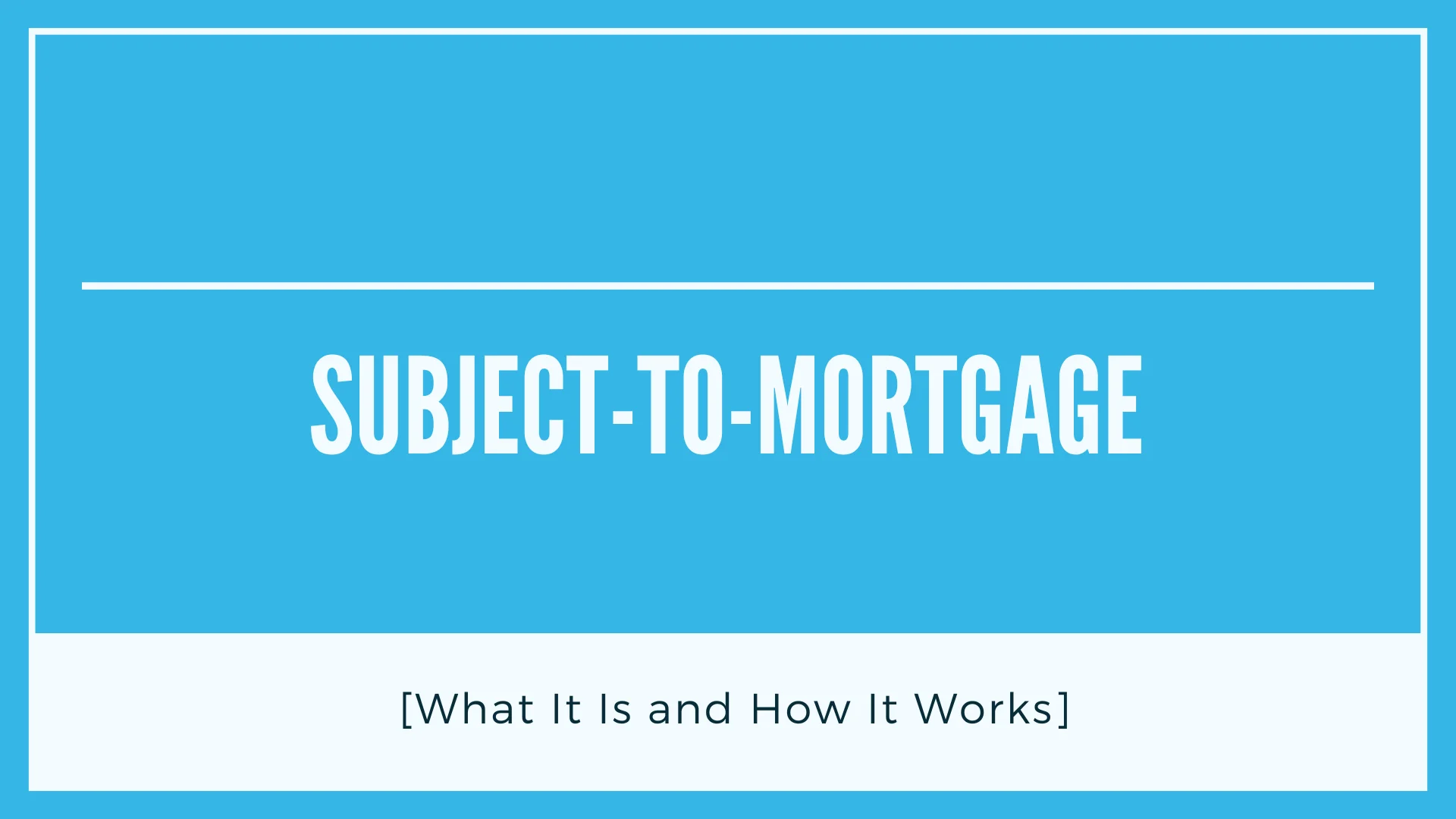A subject-to-mortgage deal can be particularly advantageous for real estate investors looking to expand into the midterm rental market. This strategy allows for the rapid acquisition of properties that can be quickly turned into rental units for tenants needing accommodations for several months. Instead of taking on a new mortgage, you simply continue paying the original owner’s mortgage, which can expedite the transition of the property into a profitable midterm rental. While this approach offers the benefit of a fast transaction without the need for loan approval, it also carries specific risks and complexities that must be carefully managed to ensure the property can generate stable rental income over its intended occupancy period.
What Is Subject-to-Mortgage in Real Estate?
A subject-to-mortgage arrangement means that the real estate investor agrees to take on the mortgage payments for the existing loan. However, the mortgage contract is not formally transferred to the buyer and remains with the seller. While the buyer becomes the legal owner, the lender is not informed of the seller’s existing mortgage being paid by a new party.
When a property is subject to an existing mortgage, you will essentially exchange your mortgage payments to the seller for the right to retain the deed to the property. The buyer provides money to the seller to pay off the existing loan balance, and they take over the property immediately with the deal.
As all that’s being transferred is the deed and the original lender is not involved, the buyer can often bypass many of the upfront costs of a traditional loan, like closing costs and down payments.
This can be an attractive financing option for both parties involved. The original borrower is typically behind on their mortgage payments in a subject-to-mortgage sale, so they will be able to get out from under their existing mortgage balance.
It’s a good option for a buyer during economic downturns because the existing mortgage terms may be more advantageous to them, particularly when interest rates rise.
How to Find Subject-to-Mortgage Properties
If you want to acquire property under a subject-to-mortgage agreement, your best resource for finding these offers is other real estate investors and real estate agents.
Firstly, investor groups in your area can be an excellent option, as they may know of a property owner undergoing financial difficulties who may be open to having the buyer pay off their existing financing. They can also assist you in finding listings, as well as navigating any local regulations that may restrict straight subject-to-mortgage loans.
Real estate agents can also be helpful — they have extensive connections throughout the area and can help you through the process of buying subject-to-mortgage homes.
This can include former clients who are now seeking short sales to avoid foreclosure, as well as new listings whose sellers may favor subject-to-mortgage deals due to certain circumstances that require a fast transaction. As with other investors, they can also assist you in navigating any local laws that may restrict such sales.
If you’ve exhausted these resources, you can check local listings on various sites, whether traditional MLS-linked sites like Zillow and Redfin or more niche places to sell subject-to-mortgage such as Craigslist or Facebook.
As some sellers may not be aware of these unique real estate transactions, you will need to explain that while buyers become the legal owners, this does not mean that the existing mortgage carries over to them — it will still be under the original borrower’s name. Be prepared to explain the mechanics and address their concerns.
Understanding the Mechanics of a Subject-to-Mortgage Deal
First, it’s important to understand the difference between subject-to-mortgage and loan assumption. With subject-to-mortgages, neither the buyer nor seller informs the bank that someone else is now taking over the existing mortgage payments. With a loan assumption, the existing loan is formally transferred over to the buyer.
Loan assumptions generally mean that the buyer will need to qualify for the original loan themselves. By contrast, with subject-to-mortgages, they are just making payments without actually assuming the loan.
This helps prevent the initiation of the due-on-sale clause common in mortgages, which allows the bank to demand the entirety of the existing loan balance with the transfer of the seller’s mortgage.
There are three types of subject-to-mortgages:
Straight-to-cash loan –The buyer will pay the entirety of the remaining balance on the existing loan to the seller as soon as the transaction is complete. This is a good option for those who have strong cash flow but whose credit score may disqualify them from taking out their own mortgage.
Seller financing – Next is the straight-to with seller carryback, also known as seller financing. These are most commonly found with a second mortgage, but it could also be for a land contract or lease option. This option comes with down payments for part of the loan balance, which is paid to the original lender. Then, the seller and buyer agree on a separate interest rate for the rest of the balance. This portion is then paid to the seller, who in turn pays the lender.
Wrap-around subject-to – The seller makes money by charging slightly higher interest rates on a portion of the sales price. For example, say the sales price is $250,000 with an interest rate of 4%. The seller charges the buyer 5%, and the buyer provides a down payment of $30,000, with the seller carrying the remaining $220,000 over time. The seller then makes 5% on the first $30,000 and 1% on the remaining $220,000.
When it comes to subject-to legal considerations, the title is transferred to the buyer, but the seller’s mortgage is not. This means that the buyer has the legal rights to the property, while the seller retains legal responsibility for the existing mortgage.
To do a deed transfer, the seller, known as the “granter,” and the buyer, known as a “grantee,” will work with a real estate attorney on a document stating that the house or land is now the legal property of the buyer.
After the deed is signed, the buyer transfers the mortgage payments to the seller, who then pays the loan originator on their behalf. This means that you will be sending the payments straight to the seller, which is part of the reason it is called a straight subject-to.
The lender does not need to be informed of the legal transfer, but if they do find out, they may authorize the due-on-sale clause for the home subject to the mortgage.
Advantages and Risks for Buyers
When you buy property, subject-to agreements can be very advantageous, especially in a difficult real estate market. It can help you get more favorable interest rates than you may be able to get otherwise if conditions have changed significantly since the seller originally bought the house.
As you won’t be working directly with the lender, you bypass origination fees and closing costs, though you may still have to put a portion of the purchase price down. You also won’t need to qualify for the loan, making it a good option for those who want to acquire property but may not be able to get a mortgage.
However, there are some ethical concerns for both you and the seller. As the seller will be subject to the existing mortgage, they will face a hit to their credit score if you fail to make mortgage payments on time, so you may need to undergo extensive negotiation to reassure them.
There is also the fact that if a home subject to an existing mortgage has been legally transferred and the bank finds out, they can use the due-on-sale clause to demand the remaining loan balance immediately, potentially putting you into foreclosure. You may also lose the house if the seller goes bankrupt.
Advantages and Risks for Sellers
With subject-to-mortgage agreements, the seller is typically facing financial problems that make it difficult to pay their mortgage. Buyers who acquire properties subject to an existing mortgage will have more financial means to make payments, which provides the seller with relief from this obligation.
As the lender is not involved, a home subject-to sale is often much faster, which makes it a good choice for those who need money quickly. All that needs to be done is a deed transfer, a contract for the mortgage payments, and any down payment that the seller requests.
There are some legal considerations and potential risks for the seller. Because the seller maintains legal liability for the existing mortgage, the buyer’s credit history won’t be impacted if they miss payments — but the seller’s credit will. A low credit score can prevent them from obtaining traditional financing like conventional mortgages for their next property.
Just as with the buyer, the due-on-sale clause can cause problems for the seller. If the buyer can’t pay the total loan balance when the bank calls it due, the home may go into foreclosure, and the seller’s credit score will then be impacted.
Both parties involved must think carefully about the mortgage agreement. Getting advice from legal and financial professionals is a must, as is developing a good contract.
Subject-to-Mortgage Pros and Cons
A subject-to real estate transaction can be useful, but it also comes with considerable risk to both parties.
The primary benefit of a subject-to transaction for all parties is that it is a faster process than the traditional loan route. The seller and buyer agree on the terms and then transfer the deed to the home over. This means that there is no complicated loan approval process, which would be necessary if the loan was also transferred.
This is helpful if the seller is undergoing difficult financial circumstances and is at risk of foreclosure, which would greatly impact their credit score and make it harder to buy another property.
It can also help real estate investors, as they can quickly take ownership of a property and begin to rent it out for profit. This is especially true if they have multiple mortgages and may struggle to get a loan on a new property otherwise.
Buyers can receive better interest rates if the market has changed since the seller originally purchased the home. This is particularly true if they have a poor credit score and aren’t eligible for a good mortgage rate.
While the seller may charge a small amount of additional interest, this can still be lower than the current rate. The seller benefits from the ease of transaction and the relief of their debts.
However, a subject-to sale requires a great deal of trust and communication between the parties, as both take on significant risk. If the seller declares bankruptcy while the mortgage is still active, the bank will foreclose on the home, and the buyer will lose their investment.
On the other hand, if the buyer fails to make the mortgage payments, it negatively impacts the seller’s rating, damaging their ability to get favorable interest rates in the future.
Here’s a quick recap of the pros and cons:
![Subject-To-Mortgage [What It Is And How It Works] 1 Subject-to-mortgage [what it is and how it works]](https://visiolending.com/wp-content/uploads/2025/03/When-to-Get-a-DSCR-Loan-vs.-When-Not-To.webp)
Legal and Financial Implications
We’ve discussed many of the financial and legal implications of a subject-to agreement, but there are a few other things to keep in mind with these kinds of deals.
Title transfers can be an issue that buyers and sellers run into with any legal transfer of property, particularly as these transfers take place without the lender’s knowledge.
Should they become aware that the property is now legally owned by a different individual, they can call the loan due immediately, potentially causing financial hassles for the borrower. The seller is also vulnerable to credit score damage should the buyer fail to pay.
Many jurisdictions require full disclosure of a subject-to-mortgage agreement to any buyer of a property. This means that if you are trying to flip the property, you will have to explain the prior legal arrangement to the new buyer. It’s important to get everything related to the transaction in writing to protect yourself and your asset.
Property taxes and insurance also become a problem when you perform a subject-to deal. You need to have proper homeowners insurance, so the seller will also need to transfer this over to you. You will need to negotiate who will pay the property taxes when they come due.
Lastly, if the seller has any equity remaining in the property, they could lose this should anything happen after the transaction. It’s essential to discuss these issues beforehand to protect both your investment and the seller’s equity.
Subject-to-Mortgage Examples
As an example, assume that you find a distressed property that only needs light renovation. The current mortgage is for $120,000. There’s $90,000 remaining, with monthly payments of $900. You estimate that it will be worth $180,000 after you renovate and sell it.
You develop an agreement with the seller to take over the rest of the mortgage, providing them with $30,000 upfront and agreeing to spread out the remaining $60,000 with the original interest rate. You’ll provide the $900 as you work to renovate the house.
The overall renovations cost $20,000. When you pay off the rest of the mortgage, you’re able to sell it for your estimated price, meaning that you received a $70,000 profit after your initial investment.
In another example, a property has an initial mortgage of $200,000 with $120,000 remaining, taken out with a rate of 4%. Its current market value is $250,000, and the current market interest rate is 6%. The buyer agrees to take over the remaining $120,000 mortgage at 5% interest and with $20,000 down.
The seller makes 5% on the initial payment of $20,000 and 1% interest on the remaining $100,000. At the same time, the buyer gets a $250,000 house for $120,000 and a 1% lower interest rate than they would otherwise.
Tips and Best Practices
When buying property subject to an existing mortgage, it’s critical that you do your proper due diligence on everything surrounding the sale. You should retain legal counsel and have them carefully review all aspects, including making sure that the title is properly transferred.
Make sure that you work out who will pay for the property taxes and have the homeowner’s insurance transferred to your name. You’ll also want to check beforehand that there are no liens on the home or unpaid property taxes, which may become your responsibility otherwise.
Investigate the lender’s sale clauses to check that the loan will not immediately come due. If it will, you may do better with a loan transfer rather than a subject-to deal. Make sure you have a plan in place to pay the loan early should it be discovered that it has been transferred into your name.
Trust is an important part of any real estate deal, but it is especially so in this instance — your financial health will be tied up with the seller’s. They may already have difficult financial circumstances that make them more vulnerable to bankruptcy, which will imperil your investment.
They, too, are relying on you to provide the mortgage payments on time so that they will not default. Discuss all of this frankly with the seller, explaining both the pros and cons of such a sale with them so that they are ready to sign.
Is Subject-to Mortgage the Right Choice for You?
Buying subject-to properties can be an excellent option if you have the funds but want the ease of a direct transaction with the seller. However, it also carries risk for both you and the original owner of the property should either fall into financial hardship.
With these deals, you take ownership of the home through a deed transfer, but the seller retains the mortgage in their name. You’ll pay them in monthly installments, which will then be sent to the lender.
There are financial and legal implications to these real estate deals, like the risk of foreclosure for you and credit score damage to the seller. It’s important to weigh the pros and cons, such as the speed of the transaction and the likelihood of you getting your own mortgage, before deciding to sign anything.
If you want to learn more about how to buy excellent investment properties, contact Visio Lending. We provide a seamless mortgage experience that is specially tailored for investors, making it easier than ever to buy the property of your dreams.






